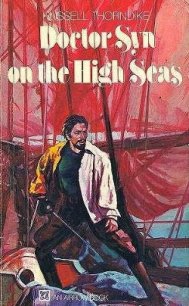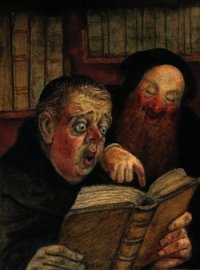The COURAGEOUS EXPLOITS OF DOCTOR SYN - Thorndike Russell (книги серии онлайн txt) 📗
large piece of broken pottery. It was the broken portion of an earthenware basin. He flung it vigorously over his
head without looking round though he knew it would fall into the deep ravine behind him, and hoped that it might
land on somebody’s head and knock them senseless. He worked on with pick, spade and shovel. He would show
these lazy ones what work he could do. He had climbed the Knoll with plenty of strong drink and hunks of bread
and cheese. He vowed he would go on till dark.
He kept laughing to himself when he thought of the villagers’ dread of the curse. That sort of nonsense would
not worry him. But some little time after he had thrown away the pottery, he had a curiously uneasy feeling that he
was being watched from behind. He told himself that he was not going to be upset by anyone. Neither was he the
sort of man to get jumpy. So he filled another shovelful and turned to throw it into space. But he did not throw it,
because what he saw so astonished him that he let the load slip from the tool. Close behind him stood a tall blackcoated figure of a man, whose eyes seemed to be piercing his soul, or rather seeking for the soul which he had lost.
In his hands this arresting figure held the piece of broken basin. Knarler told himself that he had evidently hit this
individual with the pottery, and that he had come up as an injured party to protest.
“What do you want?” growled Knarler.
“This piece of terra -cotta,” replied the other in a pleasant voice. “I am quite sure that Farmer Finn will let me
have it, as I think such a relic will not interest him very much. Of course I want to reward you for having unearthed
such a unique piece. See, my man, here is half a spade guinea. You shall have another if you can find the rest of
this.”
Knarler felt nothing but scorn for him now, though at first he had all but been frightened at his sudden
appearance.
“You keep it if you’ve a fancy for broken crockery,” he said. “But make good your promise. Where’s the half
guinea?”
The bla ckcoated one casually tossed a gold coin across to him. It fell on the grass at Knarler’s feet. The
astounded ex-slaughterman picked it up, bit it, and found that it was good currency. Then this mad-brained
generosity made him suspicious.
“Who are you, and where did you come from?” he demanded.
“I climbed the Knoll to see what kind of god was raining such treasures from above,” he replied. “I climbed
faster than my servant who is following me.” He turned and addressed someone over the brink. “Let me lend you a
hand, my good Mipps.”
“I can manage nicely, sir,” grunted another blackcoated man who scrambled up into Knarler’s sight. This
second arrival was a wiry old fellow, who surveyed Knarler critically with sharp eyes.
“I am Doctor Syn, Vicar of Dymchurch, Mister Knarler, and this is my Sexton, Mipps. Look, my good Mipps,
what I have achieved. A most illuminating example of the Roman period.”
The little man looked at it with disgust. “It ain’t much good, sir, surely? It looks to me broke.”
“You keep your trap shut,” warned Knarler. “If the gentleman likes it, what’s that to you? I’ll sell him some
more at the same price. I can do with the other half of this guinea-piece.”
“Half a spade?” echoed Mipps. “And I has to dig graves for a eightpence. Something wrong somewhere.”
“Nothing is wrong,” replied Syn. “In fact, everything is right if Mister Knarler of Cranbrook will only do me a
favour.”
“Mister Knarler of Cranbrook,” repeated the digger. “You seem to have heard about me somehow.”
“Do you know him, sir?” asked Mipps.
“I do, I do,” went on the Vicar with enthusiasm. “He is the man who can remove mountains, and make rough
places plain. Mister Knarler, you can help me, and then yourself to some more of my gold.”
“Let’s have it, and tell me what,” said Knarler.
“This find from Roman days,” whispered the Vicar, “is but the key to further treasures of equal value. If you will
only dig as I ask you, how rich you can grow.”
“I has to dig the lot away, so may as well clear the bit you want done first.”
“I knew I should like you, Mister Knarler,” laughed the Vicar. “They tell me you have no fear of this Scarecrow
that has banned the moving of this hill. Well, I applaud your courage. I attack the Scarecrow, too, don’t I Mipps?
Yes, Mister Knarler, I preach against him from my pulpit.”
“And me always telling you not to, too,” put in Mipps.
“Now see her,” continued the Vicar. “This piece of pottery is part of a military wash pot. Finding it in the
hollow there, tells me that in the face of the cliff behind it here we shall uncover
the remains of a Roman captain. Clear all this grass, Knarler, and then cut the chalk into a level face. I have no
doubt but that we shall find a tomb. All sorts of things buried with him. Sword, buckler, his personal properties,
like wine flagon, milk-jug”
“And the rest of the wash-pot?” suggested Mipps.
“I think not, Mipps,” corrected the Parson. “That should be where this piece came from, at his feet. He will be
buried standing to attention. How splendid. If Mister Knarler works hard we shall see a dead man upon the face of
the chalk. I will pace out where you must dig. From here to here. Show me a nice white face of cliff, and then Ill
come along and help you. We’ll have a corpse to show for our pains. Work well, Knarler. I fear I must leave you
now for my duty. Clear the chalk, my good man.”
“I will, and you of guineas, too, I hopes, sir. If his milk-jug’s there, you’ll have it and the rest of the wash-pot,
too.”
They left him hard at work.
Out of sight and at the bottom of the Knoll, Doctor Syn mounted his fat white pony that had been peacefully
grazing. Mipps followed suit upon the churchyard donkey. As they rode off at a walk Mipps saw the piece of
pottery that had cost his master half a guinea.
“Wait, sir,” cried Mipps. “you’ve gone and dropt your wash-pot. I’ll pick it up.”
“Not worth the carrying,” replied Syn. “Nothing Roman about it. Modern. Dumped there not more than a year
or so.”
“Then why pay gold for it?” whined Mipps.
“Because, as you know, the Scarecrow pays well for any work he wants done. And he happens to want a white
facing of chalk upon the sea side o f the Knoll. When that is done the work must be stopped, as we agreed it must be
stopped. It is only that I have changed my plans slightly. Ride close beside me and you shall hear.”
Meanwhile Knarler worked on feverishly, determined to find the Roman captain and his belongings that very
day. The crazy Parson would pay him well. If not he would smash up such treasure as he found under his eyes
unless the pay was double. The Parson would fall for such a threat. Although he did not waste time in eating, he
constantly fortified his strength with copious gulps of spirit. By the time the sun set in Fairlight Bay he was drunk.
But he worked on, eyeing with pleasure the growing whiteness of the uncovered chalk. At twilight the Parson
visited him, and after congratulations, encouraged him to go on.
“Plenty of time,” growled the exhausted drunkard.
“But there is not,” contradicted the Parson. “Farmer Finn had had a message from the Admiralty warning him to
allay proceedings till Whitehall has looked into things. I had this from Finn himself. He is still obstinate, but their
appeal to his loyalty has weakened him, It is not-pleasant to do a disservice to your country, and this landmark is of
value when we are at war with the French yonder.”
“Don’t fret, sir,” chuckled the digger. “I’ll get that Roman before downing tools.”




